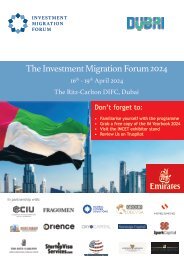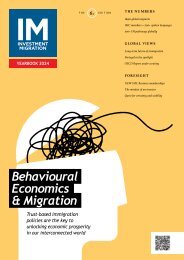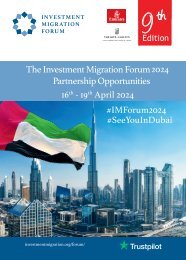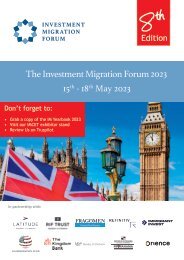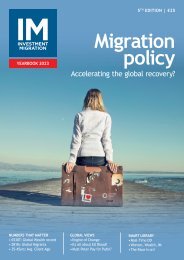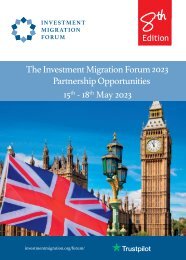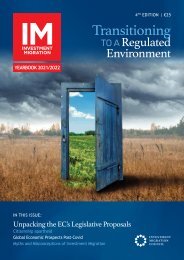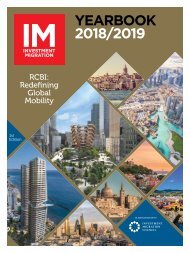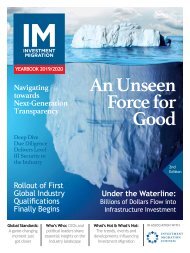IM Yearbook 2020/21
Born from the need for a global, credible, “go-to” publication, the 3rd IM Yearbook offers valuable access to a prime target audience of top industry influencers, decision makers, and the foremost referral network to the world’s most influential Investment Migration programmes: Government officials such as Heads of CIU’s, policy makers, academics, migration agents, law firms, wealth managers, financial advisors, real estate developers, and international firms involved in investment migration.
Born from the need for a global, credible, “go-to” publication, the 3rd IM Yearbook offers valuable access to a prime target audience of top industry influencers, decision makers, and the foremost referral network to the world’s most influential Investment Migration programmes: Government officials such as Heads of CIU’s, policy makers, academics, migration agents, law firms, wealth managers, financial advisors, real estate developers, and international firms involved in investment migration.
You also want an ePaper? Increase the reach of your titles
YUMPU automatically turns print PDFs into web optimized ePapers that Google loves.
Interview with KRISTIN SURAK, Assistant Professor at the London School of Economics<br />
THE RISE OF THE GLOBAL<br />
REGIONAL CITIZEN<br />
Covid-19 will transform the investment migration market and will accelerate the<br />
already existing trend of regionalisation, says Prof. Kristin Surak from the London<br />
School of Economics and author of the forthcoming book Citizenship 4 Sale.<br />
The Covid-19 pandemic has challenged<br />
international mobility like no other<br />
event before. What observations<br />
about the investment migration<br />
industry during the coronaviruscrisis<br />
can you share with us?<br />
Covid-19 has shown us that we need to<br />
rethink the mobility aspect of investment<br />
migration as travel bans and border<br />
closures haven proven how fragile this<br />
element is. But more than that: the crisis<br />
clearly highlighted a key difference<br />
between citizenship by investment and<br />
residence by investment. Demand for<br />
citizenship-by-investment programmes,<br />
much more than demand for residence<br />
programmes, has long been driven by<br />
promises of easy mobility and visa-free<br />
travel. However, a Caribbean passport<br />
holder was not able to use his or her<br />
90-day-visa-free access to Europe during<br />
the first part of the global lockdown.<br />
On the other hand, despite the Covid-<br />
19 travel restrictions, the majority of<br />
OECD countries were not only allowing<br />
citizens but also those holding resident<br />
status to enter. In other words: An<br />
RBI-investment in places like Portugal<br />
or Greece opened a closed border.<br />
How is this affecting the attractiveness<br />
of RBI and CBI programmes?<br />
For those worried about not being able to<br />
enter Europe, the traditional RBI countries<br />
suddenly looked more appealing. Russia<br />
is the exception, where during the height<br />
of lockdown, a person needed a second<br />
citizenship to leave the country. But that’s<br />
the exception that proves the rule. The<br />
pandemic has strengthened the demand<br />
for a real insurance policy. This has shifted<br />
the focus away from mere border crossing<br />
and short-term mobility towards securing<br />
rights in a place where one would want to<br />
spend a longer stretch of time. First and<br />
foremost, I believe this will trigger demand<br />
for investment migration programmes<br />
of bigger countries – countries that have<br />
a lot more to offer in terms of business<br />
and lifestyle opportunities compared<br />
to the micro-states that pioneered this<br />
industry. The Caribbean has yet to<br />
convince a significant number of highnet-worth<br />
individuals to move there.<br />
I believe wealthy investors will<br />
continue to express interest in the<br />
European RBI programmes of Portugal,<br />
Spain and Greece. I also think Turkey<br />
will continue to build on its substantial<br />
success. Its CBI programme has a<br />
different pull for people than the<br />
Caribbean options, or even the EU<br />
option. Many of the benefits that it offers<br />
are located within Turkey, although<br />
it does offer benefits outside the<br />
country in terms of travel and business<br />
possibilities in Europe, too. Istanbul<br />
is a global city and Turkey a regional<br />
powerhouse. Its booming economy<br />
and emerging market status make it<br />
an interesting country for investors<br />
to engage with, especially for those<br />
wanting to do business in the region.<br />
22<br />
Investment Migration <strong>Yearbook</strong> 2O2O/2O<strong>21</strong>




